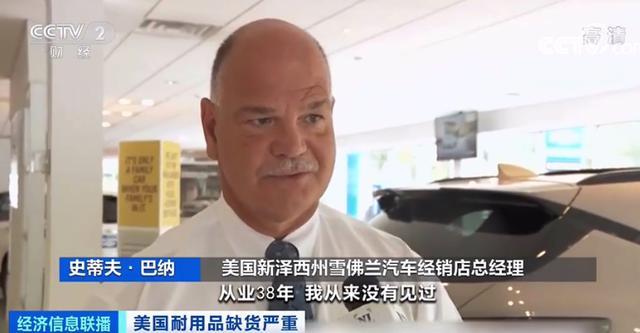Americans "No Cars to Sell"
The "chip shortage" is still not over, which has greatly affected the US auto industry: production capacity has been hit, market demand is still strong, and the new car inventory of US auto dealers fell below a record low in July.
The second-hand car situation is not optimistic. June of this year was the hottest time in the second-hand car market. However, the national inventory was only able to support 34 days. At the same time, the average price of second-hand cars increased by more than 45% compared with June last year.
Not only the car sales market, but also the shelves of home appliance retailers are empty.
01 U.S. auto dealer inventory drops to a record low

According to CCTV Finance, Steve Barner, general manager of a Chevrolet dealership in New Jersey, said: "I have been in the business for 38 years. I have never seen such a small inventory of new cars. There are even consumers in North Carolina and Wisconsin. Call to inquire."
According to Barna, there used to be 500 new cars in the store every day to buy, but now there are only 80 cars at most, and they can only persuade customers again and again if they lack inventory.
Insufficient inventory, new car sales prices are also rising. Data show that in July this year, the average selling price of a new car in the United States was US$41,044, or about RMB 265,000, a record high.
According to a report in Chengdu Business Daily in May, according to research firm Autoforcast Solution, automakers have to reduce production of more than 1.2 million vehicles in North America because they cannot adequately ensure semiconductors for safety systems, brakes and engines. In addition, according to the statistics of the research company Watts Intelligent Company, as of the end of April, the dealer’s store inventory (including the expected arrival of new cars) was less than 2 million, which is only about half of the usual, which is more than 30 years. The lowest level.
In response, consumers frustrated in the new car market turned their attention to the used car market, but the inventory situation here is even worse.
Second-hand car buyer Debbie Kozel: When I walked into the store, all the cars were almost sold out, so I had to make up my mind instantly, as if other buyers were staring at me.
Data shows that June this year was the hottest time for the second-hand car market. At one time, national inventories could only last for 34 days. At the same time, the average price of second-hand cars rose by more than 45% compared with June last year.
Not only the car sales market, but also the shelves of home appliance retailers are empty. Ron Burger works for a home appliance retailer in Michigan, USA. He said that the store usually lacks four or five products at most, but now they have more than 300 home appliances out of stock.
The problem of out-of-stocks by merchants also makes consumers very anxious. Recently, Marty Cooper from Pennsylvania wanted to buy a dryer for the winter, but was told that the delivery time would be as long as six months.
Data show that as of June this year, the value of durable goods orders in the United States has increased 13 times in the past 14 months, and US residents have strong demand for this category of goods.
02

Ford and GM's production capacity suffers
Currently, a car requires approximately 1,400 different computer chips, and the lead time for related chips may be as long as 180 days. Each chip must go through a strict quality control process to ensure that it can work for at least 20 years.
Affected by the global "chip shortage", raw materials are in short supply, and due to the global spread of delta mutant strains, the epidemic has complicated production and transportation conditions, the supply chain is facing challenges, and the delivery of new cars has been delayed. Many automakers suffer To the impact.
Recently, American automobile giant General Motors announced that two best-selling models will be discontinued or reduced.
Not only is there a shortage of raw materials, but the assembly lines of major US manufacturers do not have enough workers to expand production capacity. This phenomenon has not improved because of the slowdown of the epidemic.
Jay Timmons, president of the American Manufacturing Association, said: "During the epidemic lockdown, the manufacturing industry had 300,000 vacancies at its lowest point, but today, 851,000 jobs in the US manufacturing industry cannot be recruited."
Deloitte, a world-renowned business consulting company, predicts that by 2030, the US manufacturing industry may face 2.1 million job vacancies, which will cause economic losses of up to 1 trillion US dollars, or about 6.5 trillion yuan.
It is worth mentioning that the shortage of chips has severely damaged Ford's production capacity, especially when compared with General Motors.
Motor Intelligence data shows that Ford's sales in July fell by 32% year-on-year, and GM's sales fell by 3% year-on-year. Ford’s market share in July fell from 14% in the same period last year to 9%, while GM’s market share fell to 15% from 17% in the same period last year.
While the automobile production side was dragged down by the "core shortage", sales of electric vehicles in July increased by about 106% year-on-year, sales of hybrid vehicles increased by about 65% year-on-year, sales of SUVs increased by about 9% year-on-year, and sales of pickup trucks decreased by about 3% year-on-year. In addition, pickup trucks and SUVs accounted for 18% and 54% of total sales, respectively, compared with 20% and 52% in the same period last year.
03
There will still be a 10% supply gap in global chips
Murat Aksel, Head of Purchasing on the Flowserve Board of Directors, has said that the problem of chip supply shortages is expected to be alleviated in the third quarter, but long-term supply bottlenecks will continue to exist because it takes up to 2 years to build new production capacity. In the long run, there will still be a 10% supply gap in global chips.
From this point of view, it may take a long time for dealers to restore their inventory to normal levels.
Volkswagen warned in July that the global semiconductor shortage affecting car production will worsen in the next six months. This marks a huge shift in industry expectations. Car manufacturers were previously optimistic that the chip crisis in the automotive industry will bottom out in the second quarter and will gradually improve in the next six months.
Consulting firm AlixPartners warned that the shortage of chips may cause the global auto industry to lose 110 billion U.S. dollars, which is an increase of 81.5% from its estimated loss of 61 billion U.S. dollars in January this year. In terms of production, AlixPartners predicts that global auto production will drop by 3.9 million vehicles this year, which is an increase of 77% from the 2.2 million vehicles it forecasted in January this year.
In addition, Goldman Sachs expects that the "chip shortage" is not over yet, and that automobile production problems will persist in the short term.
Partly integrated from CCTV Finance, author Xia Yuchen, editor Wang Li.
There are risks in the market and investment needs to be cautious. This article does not constitute investment advice.
Star-marked Wall Street sees and hears, don’t miss good content


